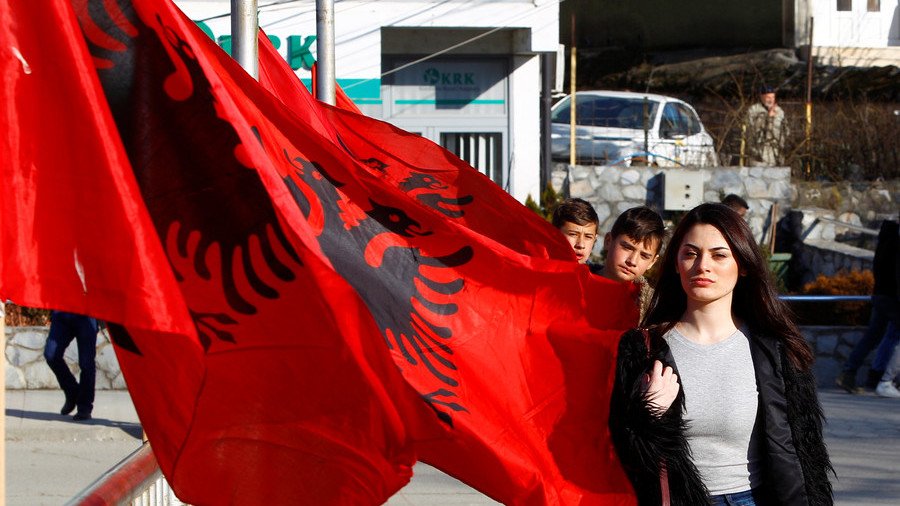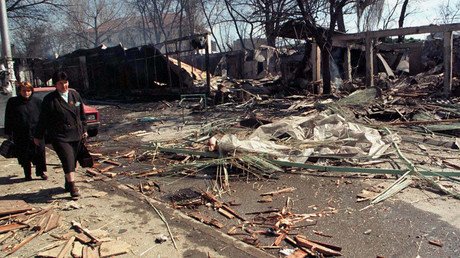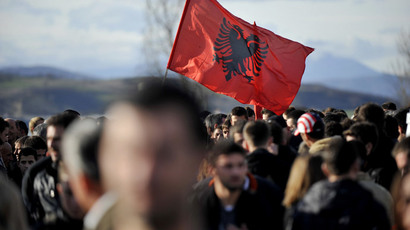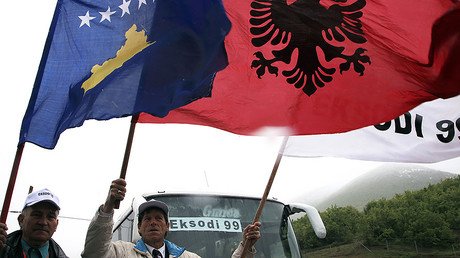Kosovo: A decade of dependence

For all the talk by Western governments of sovereignty and ‘rules-based world order,’ the case of Kosovo is a haunting example of hypocrisy. Ten years after declaring independence, the troubled province is still a ward of the US.
A gilded statue of Bill Clinton adorns the main square in Pristina, the Kosovian capital. Nearby is a “Hillary” boutique, selling women’s couture (no word on pantsuits). One Albanian town even erected a bust of Hillary Clinton in 2016, anticipating her foreordained presidency. George W. Bush also has a statue in Albania, after he visited in 2007 and pledged to support the Clintons’ policy on the Albanian cause. Many children across the province are named Klinton, Tonibler, or Madeleine.
Why? Because in March 1999, US President Bill Clinton, UK Prime Minister Tony Blair and US Secretary of State Madeleine Albright spearheaded a NATO war on what was then Yugoslavia. NATO was acting on behalf of the “Kosovo Liberation Army,” an ethnic Albanian terrorist group fighting to separate Kosovo from Serbia. Though the war was intended to last no more than a few days, it wasn’t until 78 days later that NATO occupied the province, under the guise of UN peacekeepers.
The US quickly built a massive military base in southeastern Kosovo, flattening two hills in the process. Camp Bondsteel occupies 955 acres (3.86 square kilometers) of land and can host up to 7,000 troops.
Over the next nine years, the UN Mission in Kosovo (UNMIK) watched as the triumphant KLA expelled nearly all non-Albanians. It also created a provisional government with a “framework constitution,” in preparation for statehood. Though the UN Security Council never approved a 2007 NATO-backed proposal for an independent Kosovo, in February 2008, the provisional government went ahead and declared independence anyway. Fittingly, the first recognition came from the US client regime in Afghanistan.
Serbia’s government, a vassal of Washington since the October 2000 color revolution, chose to challenge the declaration before the International Court of Justice (ICJ). In 2010, the ICJ caved to Washington by redefining the question and concluding that nothing in international law prevented 'Kosovians' from declaring independence as such. The dissenting judges pointed out that this was specious reasoning, with Abdul Koroma of Sierra Leone calling it a “judicial sleight-of-hand.” So much for the “rules-based” international order, right?
Humanitarian concerns invoked to launch NATO’s illegal war suddenly ceased to exist when it was Serbs and other non-Albanians being torched out of their homes. The pro-NATO media explained this away as “revenge attacks.” Washington think-tanks used the province-wide pogrom of Serbs in 2004 to argue that ethnic Albanian perpetrators deserved independence right away. Independence was the answer to everything: poverty, corruption, pollution, lawlessness…Yet to the surprise of precisely no one, these problems have persisted to the present day.
51st state: Kosovo's bond to the US – photo essay https://t.co/bvOJ2kOgYn@Dezfulipic.twitter.com/jBRoE0xSc4
— Joanna Ruck (@joannaruck) February 16, 2018
A recent photo essay in the Guardian described Kosovo as the “51st state” of the US, illustrating the Kosovo Albanians’ devotion to Washington. In one of the photos, the Stars and Stripes flutter over posters celebrating the slain KLA insurgents and “Greater Albania,” a 140-year-old dream that would include the present-day Albania, Kosovo, another part of Serbia, as well as chunks of Greece, Montenegro and Macedonia.
Some ethnic Albanians see it as a betrayal that the West has not backed this idea, but chose to stop at an “independent” Kosovo. The group, called Vetevendosje (self-determination, in Albanian), is so committed to the values of liberal democracy, it has set off teargas inside the 'Kosovian' parliament on more than one occasion.
As to how much that parliament has a say in running the “country,” a recent report by the US government-funded Radio Free Europe/Radio Liberty ought to be the perfect illustration. After certain members of parliament tried to propose a bill, opposing the US-backed international court that might put KLA leaders on trial for war crimes, US ambassador Greg Delawie bullied them into dropping the proposal.
“Let me be clear: MPs who support this initiative ‒ and the politicians who lead it, despite their denials ‒ will be subject to specific and harsh consequences should the initiative succeed. They know this; we’ve told them,” Delawie said, according to RFE/RL.
Delawie and his UK colleague went so far as to physically sit inside the parliament hall, making sure the “independent” and sovereign Kosovians did as they were told. He told RFE/RL that Kosovo needed an outside court because its own judiciary “has not yet demonstrated itself capable of administering justice in high-profile cases” and witnesses “continue to be subject to intimidation, threats, and violence.”
All of this, and more, was brought up by the Russian envoy to the UN, Vasily Nebenzya, at the February 8 Security Council meeting. Opposing the US proposal to abolish the UN mission in the province, Nebenzya said that the decade-long “reckless undertaking” of Kosovian independence has produced “deplorable results,” from ongoing attacks on Serbs attempting to return to their homes, to the high number of radicalized Albanians joining Islamic State (IS, formerly ISIS/ISIL). Nebenzya also brought up last month’s killing of a prominent Kosovo Serb politician.
#Zakharova: NATO used the chaos in Kosovo to set up infrastructure on its territory under the cover of UNSC Resolution 1244, i.e. the Camp Bondsteel US military base, in order to project the alliance’s influence in the Balkans and manipulate processes in the region
— MFA Russia 🇷🇺 (@mfa_russia) February 15, 2018
Unwilling or unable to complain about Washington, some Kosovo Albanians are blaming the EU. Earlier this week, the Pristina daily Koha Ditore accused Brussels of “betraying Kosovo” by refusing to take a unified stand on the province’s independence, even though the 2008 declaration was coordinated with EU authorities and everyone had “prearranged roles” to play. To this day, five EU members refuse to recognize Kosovo as an independent state: Cyprus, Greece, Romania, Slovakia, and Spain.
They are joined in this refusal by most of Asia, Africa and Latin America ‒ including Russia, China, India and Brazil. Unable to browbeat major countries into accepting its illegitimate offspring, Washington has focused on breaking Belgrade instead.
If Serbia herself admits that her 1999 rape was consensual, that would retroactively legitimize the war and let NATO off the hook for violating its own and the UN charter. Yet despite bending over backwards to please their Atlantic Empire overlords, even the most submissive regimes in Belgrade have refused to take that last, irrevocable step - so far, anyway.
All this is supposed to be the model of sovereignty, independence and rules-based world order that Washington says it’s upholding? Seems like the US has some explaining to do.
The statements, views and opinions expressed in this column are solely those of the author and do not necessarily represent those of RT.















